#the Guardian
Explore tagged Tumblr posts
Text

#ron desantis#florida#child labor#child labor laws#politics#political#us politics#news#donald trump#president trump#republicans#republican#conservatives#conservate#american politics#elon musk#jd vance#law#america#americans#south#us immigration#immigration#us immigrants#the guardian#journalism#journalist#us news#trump administration#maga
31 notes
·
View notes
Text
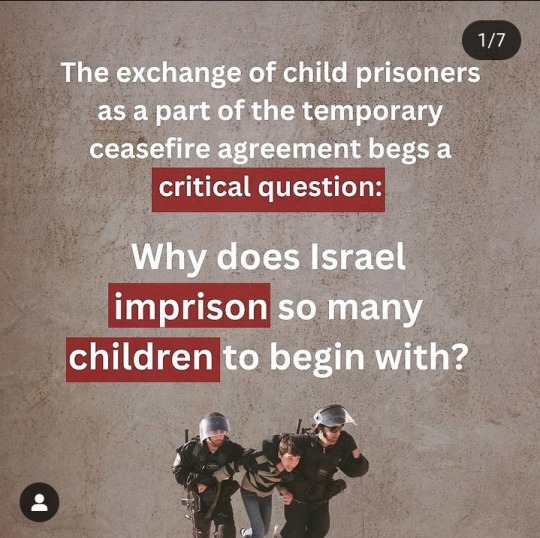

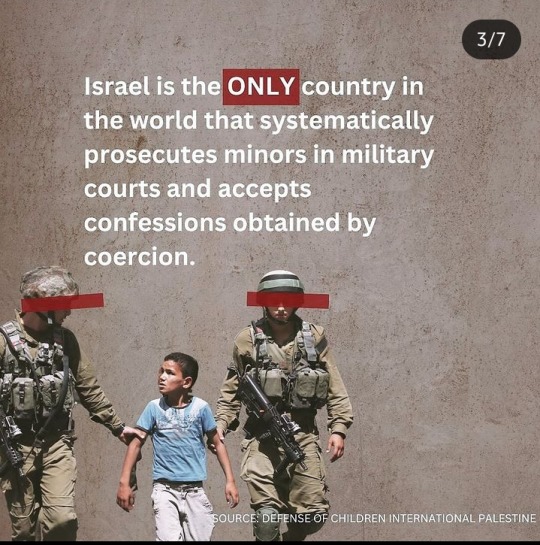
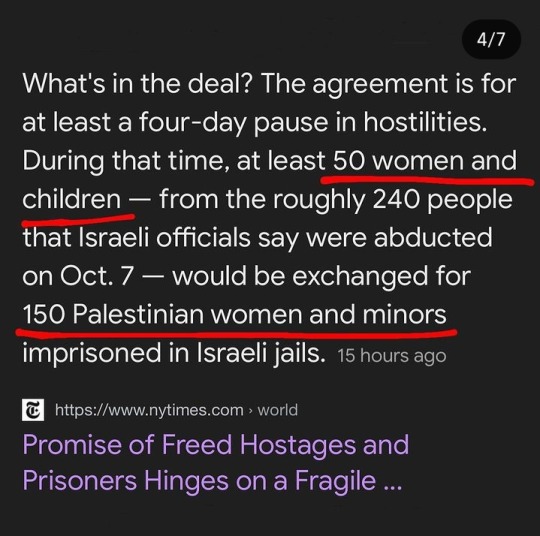
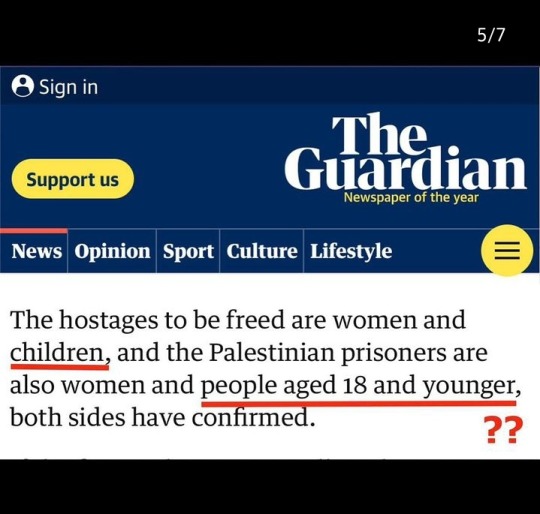

The consistent dehumanization language used in describing Palestinians in western media is unfathomable. The consistent denial of seeing our children as children. For everybody seeing this, don't fall into this, seek out the truth and educate yourself because that's the best and only way we can help people in Palestine. We have to amplify their voices.
#palestine#gaza#israel#important#current events#free palestine#ethnic cleansing#free gaza#gaza strip#gaza under attack#israel apartheid#usa#america#the guardian
40K notes
·
View notes
Text

REMINDER TO NOT TALK TO THE GUARDIAN ABOUT DIY HRT IF ASKED ❗️❗️❗️
Susanna Rustin is a huge TERF too, and a quick search of her name on The Guardian brings up repeated proof.
7K notes
·
View notes
Text

The Guardian have announced they'll no longer post on Twitter from its official accounts.
A lot can change in a week. An exodus from Twitter can only be a good thing.
2K notes
·
View notes
Text
" Men in Gaza do cry.
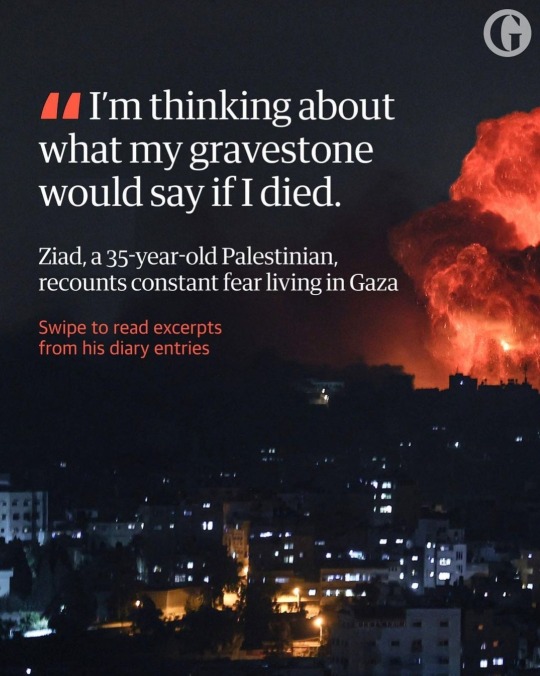
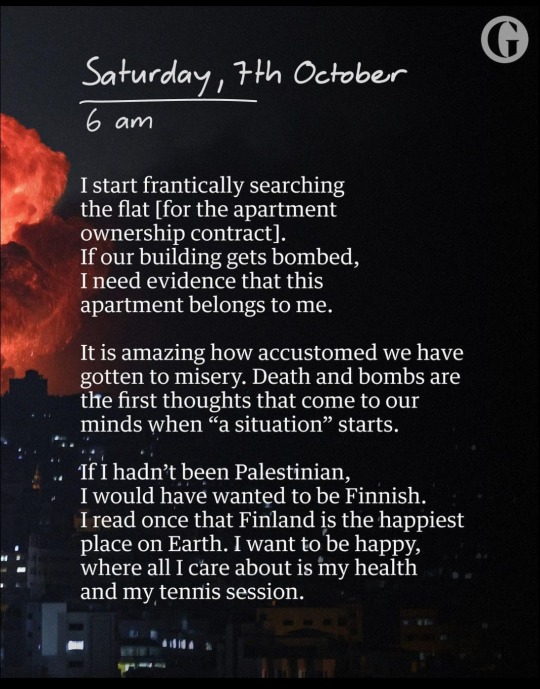
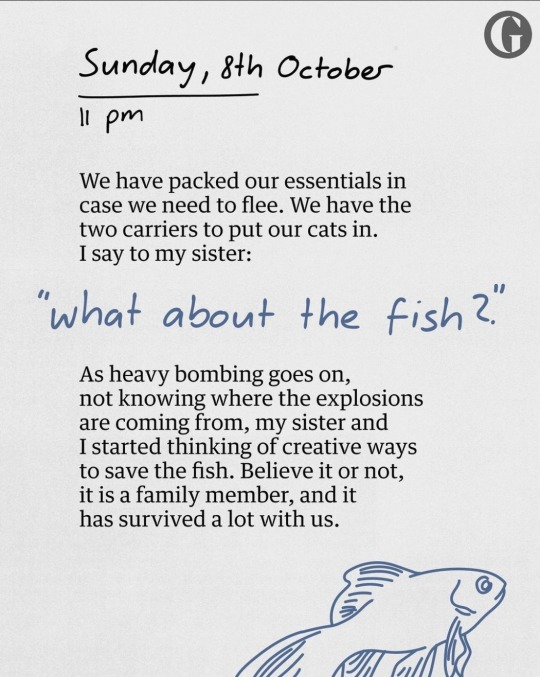
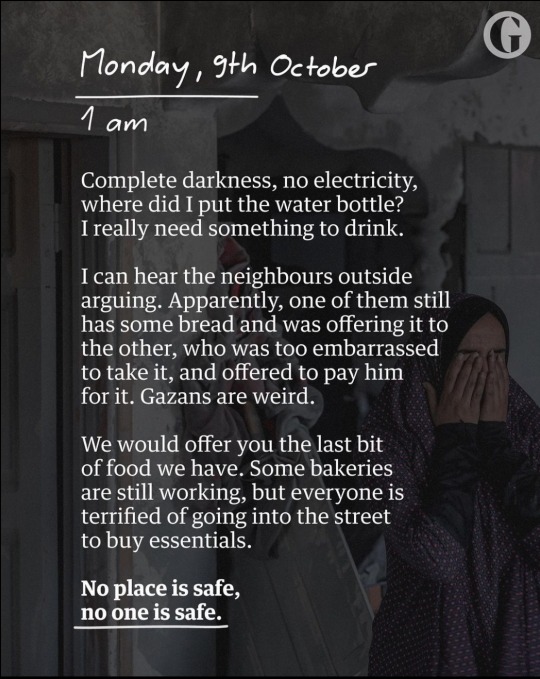
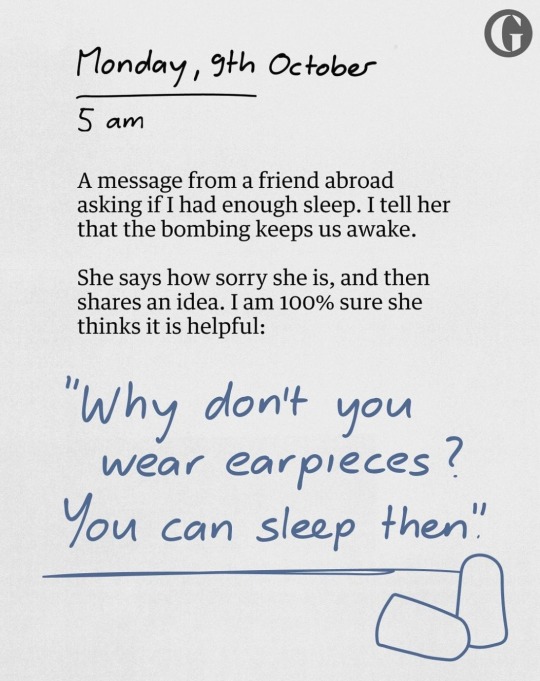
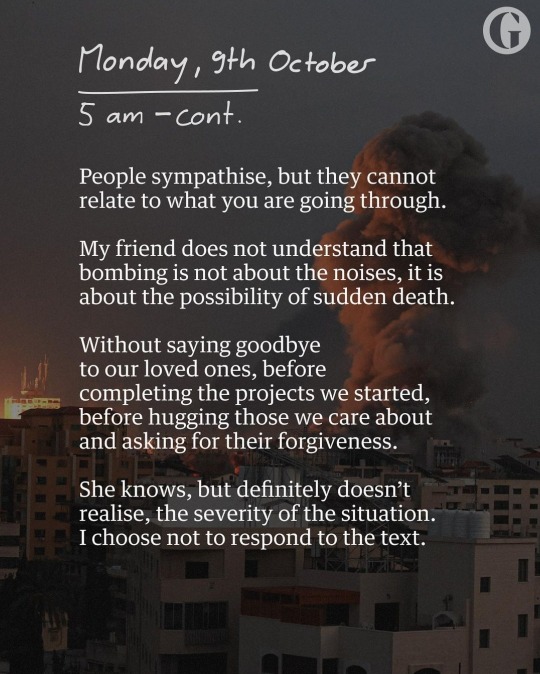
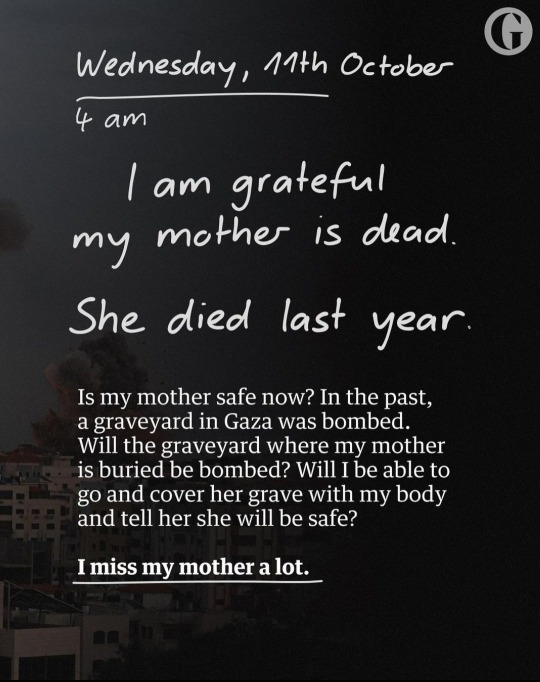
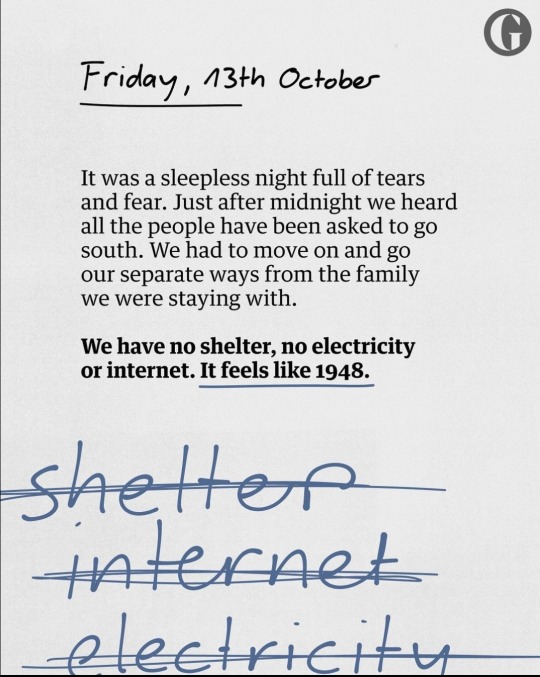
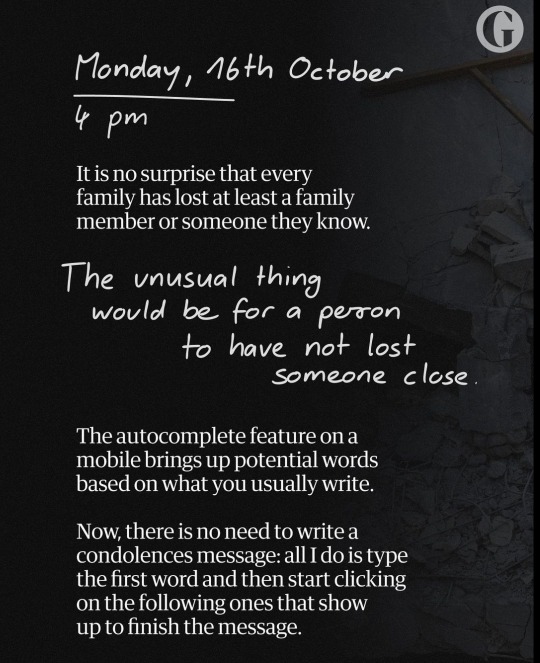
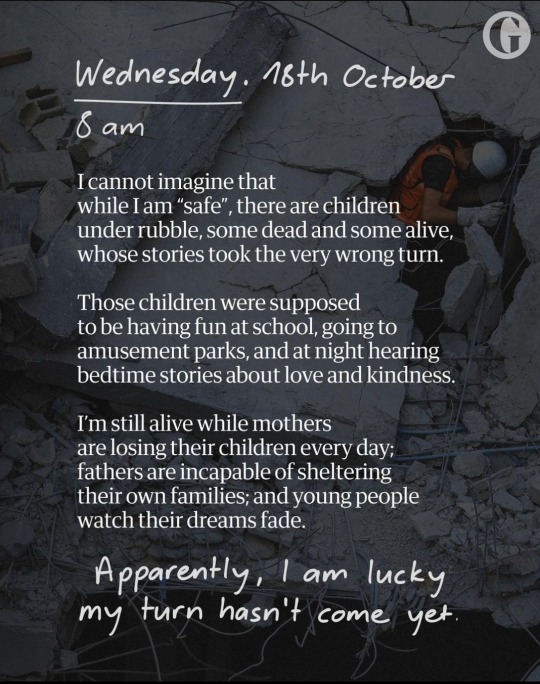
When they lose their homes that they spend their
whole lives building, they cry
When they see their dreams and hopes getting destroyed, they cry.
When they realise how scary and uncertain their future is, they cry.
And because they are human beings, full of feelings and emotions, they cry."
This is an excerpt from a 35-year-old Palestinian's account of life in Gaza under siege.
Ziad has been writing for the Guardian about the realities of the Israeli bombardment, as he, his sister and their pets, flee their home in Gaza City in the hope of survival.
You can read his diary entries in full via the link:
#palestine#free palestine#israel#gaza#free gaza#gaza strip#from the river to the sea palestine will be free#genocide#gazaunderattack#israel terror#we are not numbers#dairy#qoutes#the guardian#art#history#pictures#insta#news#instagram#peace#love#israel is an apartheid state#israel is a terrorist state
16K notes
·
View notes
Text
hey so remember those new protest laws that make peaceful protest illegal? yeah? wanna see them in action?
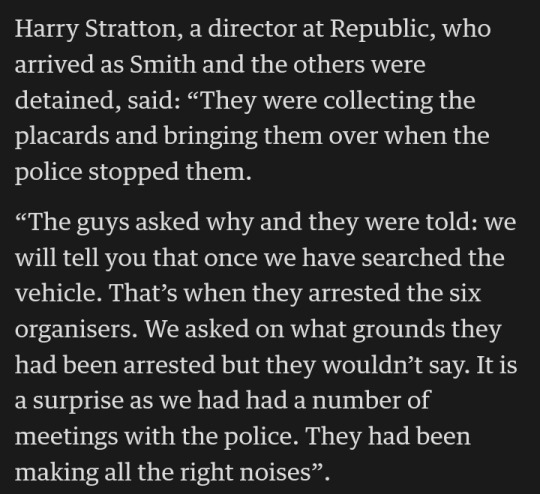


[alt text:]
Head of UK’s leading anti-monarchy group arrested at coronation protest
Republic’s Graham Smith held at protest on King Charles III’s procession route in central London
Daniel Boffey Chief reporter, Sat 6 May 2023 08.31 BST
The head of the UK’s leading republican movement has been arrested at an anti-monarchist protest on King Charles III’s procession route.
Graham Smith had been collecting drinks and placards for demonstrators at Trafalgar Square when he was detained by police on the Strand in central London.
It is understood Smith was detained after bringing a megaphone to the demonstration. The Met police had tweeted earlier this week that they would have a “low tolerance” of those seeking to “undermine” the day.
Harry Stratton, a director at Republic, who arrived as Smith and the others were detained, said: “They were collecting the placards and bringing them over when the police stopped them.
“The guys asked why and they were told: we will tell you that once we have searched the vehicle. That’s when they arrested the six organisers. We asked on what grounds they had been arrested but they wouldn’t say. It is a surprise as we had had a number of meetings with the police. They had been making all the right noises”.
full article
dont you love it when your government decides to not even bother hiding the fact the fascist tendencies theyre leaning more and more into?
#uk police#uk politics#britpol#british politics#british police#monarchy#anti monarchy#the guardian#harry stratton#graham smith#daniel boffey#charles#charles iii#coronation#hell country#police misconduct
9K notes
·
View notes
Text
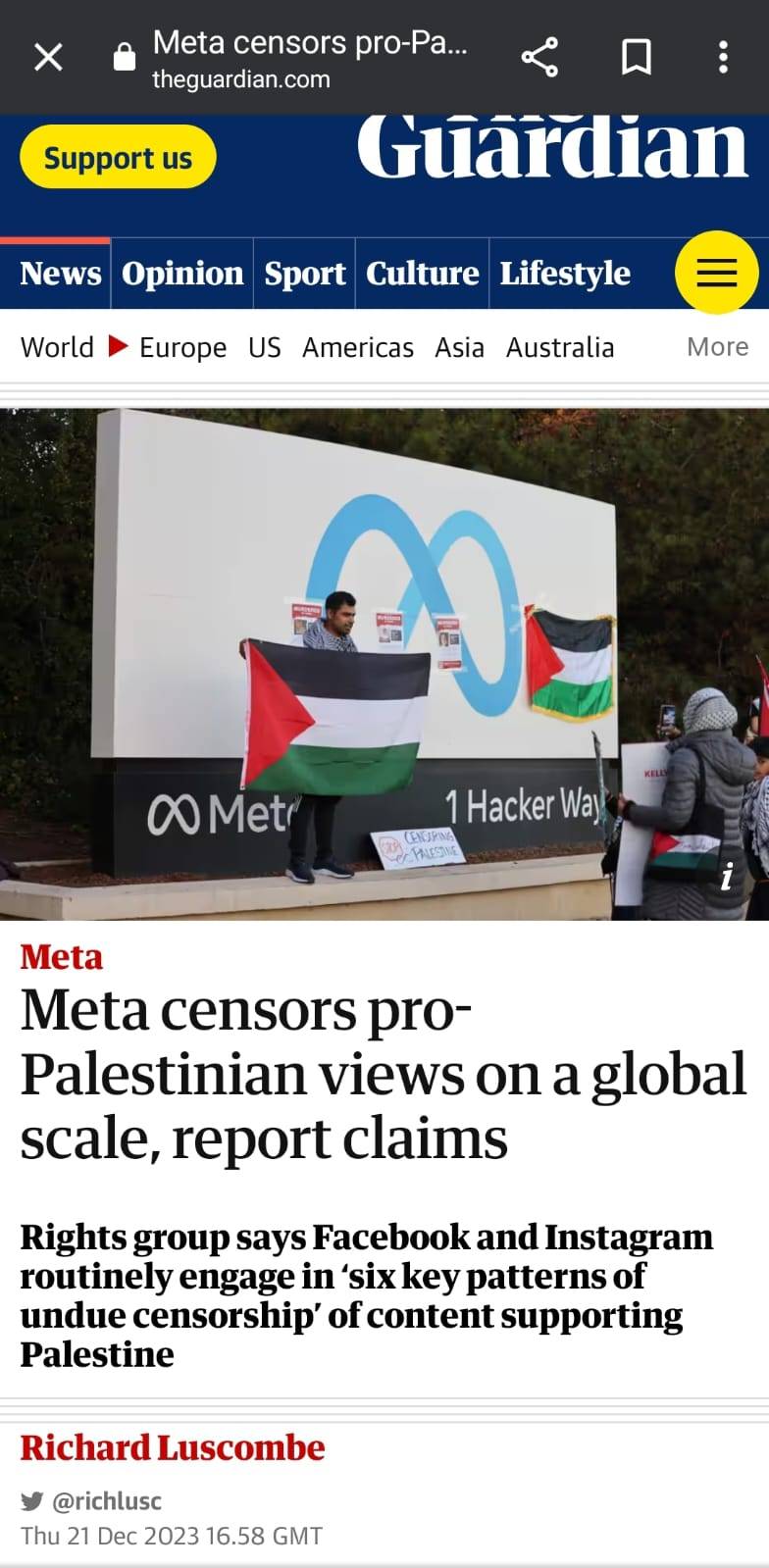
Tell us something we don't already know.
#i stand with palestine#free palestine#palestine#palestine genocide#support palestine#the guardian#israel is a terrorist state#israeli occupation#boycott israel#free gaza#save gaza#genocide in gaza
2K notes
·
View notes
Text




#palestine#gaza#free palestine#the guardian#steve bell#katie halper#nathan rebonsion#marc lamont hill
796 notes
·
View notes
Text

hyper light drifter commission for @silvyvictory <3
218 notes
·
View notes
Text

Leading Democrats on Monday demanded an investigation of possible criminal corruption involving Elon Musk, the tech billionaire and world’s richest man tasked by Donald Trump with slashing the federal government.
The investigation should involve “the Federal Aviation Administration’s decision to cancel a $2.4bn contract with Verizon to upgrade air traffic control communications, and to pay … Musk’s Starlink to help manage US airspace”, senators Chris Van Hollen, Richard Blumenthal and Elizabeth Warren wrote to Pam Bondi, the attorney general, and Mitch Behm, acting inspector general of the transportation department.
#politics#political#us politics#news#donald trump#president trump#american politics#elon musk#jd vance#law#investigation#the guardian#us news#follow#follow news#america#maga#president donald trump#make america great again#republicans#elon#republican#democrats#trump administration#economics
261 notes
·
View notes
Text

Tom Gauld for The Guardian's Autumn Reading Special.
#booklr#books#bookblr#fiction#quotes#book#tsundoku#reading#book reading#book collecting#book community#cartoons#cartoon#lit#tom gauld#the guardian#noteworthy
475 notes
·
View notes
Text
Maybe because…

441 notes
·
View notes
Text

Good time to scrap your subscription and let them know this is the reason why.
Source.
678 notes
·
View notes
Text



Outtakes
415 notes
·
View notes
Text
Decided to draw a comic of how I hope ‘Heresy’ ends.
It was a lot of fun, but wow am I not great at drawing people.
Hopefully the formatting doesn’t get mixed up!




#destiny#destiny art#destiny 2#hive#savathun#xivu arath#eris morn#the drifter#the guardian#the taken
228 notes
·
View notes